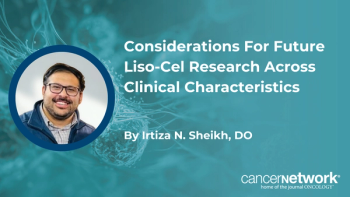
- ONCOLOGY Vol 20 No 10
- Volume 20
- Issue 10
Trial Initiated for Liposomal Vincristine in Relapsed/Refractory Acute Lymphoblastic Leukemia
Hana Biosciences recently announced the initiation of a multicenter phase II clinical trial of vincristine sulfate liposomal injection (Marqibo) in patients with relapsed or refractory acute lymphoblastic leukemia (ALL).
Hana Biosciences recently announced the initiation of a multicenter phase II clinical trial of vincristine sulfate liposomal injection (Marqibo) in patients with relapsed or refractory acute lymphoblastic leukemia (ALL). This study is designed to support a phase III pivotal clinical trial of the agent for the treatment of ALL.
Study Objectives
The primary objective of the phase II open-label investigation is to assess efficacy of weekly doses of liposomal vincristine plus pulse dexamethasone as measured by complete response rate. Secondary objectives are evaluation of safety and disease-free survival. This study is the phase II portion of an ongoing phase I/II clinical trial. Hana expects to enroll up to 44 patients in the phase II trial. Previously treated, relapsed, or refractory ALL (including lymphoblastic lymphoma and Burkitt's subtypes) patients are eligible to enroll in the study.
Disease With Few Options
Approximately 70% of adults with ALL relapse, and reported cure rates seldom exceed 40% due to several factors including poorer tolerance of and compliance with treatment and less effective treatment regimens.
"Adults with relapsed ALL have very few options for effective therapy. Several trials in lymphoproliferative malignancies including non-Hodgkin's lymphoma (NHL) and two phase I trials in ALL have shown promising potential for Marqibo to improve clinical outcomes. This preliminary data supports moving this drug into pivotal trials," commented Dr. Greg Berk, Senior Vice President and Chief Medical Officer of Hana Biosciences.
Previous positive interim data from the phase I clinical trial evaluating Marqibo in combination with dexamethasone in relapsed or refractory ALL was presented at the American Society of Hematology annual meeting in December 2004. Complete phase I data are expected to be presented in the fourth quarter of 2006.
About Liposomal Vincristine
Marqibo utilizes vincristine encapsulated in a rigid, lipid bilayer of sphingomyelin. Vincristine is an FDA-approved, standard chemotherapeutic used in most lymphoma and ALL regimens. It is a cell-cycle-specific agent whose activity is dependent on the duration of drug exposure. The sphingosome encapsulated technology employed by Marquibo results in a liposome that is more rigid than conventional liposomes. Consequently, the active vincristine leaks out of the liposome slowly and drug levels are maintained for prolonged periods of time. This improved pharmacokinetic profile, which mimics a continuous vincristine infusion, may result in greater activity in rapidly dividing cancers.
The anticipated activity associated with vincristine has traditionally been limited by its short half-life, and its inability to be dose-escalated beyond 2 mg due to neurotoxicity. In phase I and II studies, liposomal vincristine has been shown to have a significantly longer half-life and patients have been able to tolerate doses 100% greater than conventional vincristine. These trials provide the rationale for utilizing this technology in lymphoproliferative diseases, such as ALL, Hodgkin's, and non-Hodgkin's lymphoma.
Articles in this issue
over 19 years ago
Complete Guide to Colorectal Cancerover 19 years ago
Decitabine Receives US Orphan Drug Designation for AMLover 19 years ago
New Questions About Transplantation in Multiple Myeloma: Review 1over 19 years ago
FDA Approves Drug Combination for Ovarian Cancer Recurrenceover 19 years ago
Stage III Lung Cancer: Two or Three Modalities? Review 1over 19 years ago
New Questions About Transplantation in Multiple Myeloma: Review 2Newsletter
Stay up to date on recent advances in the multidisciplinary approach to cancer.





































